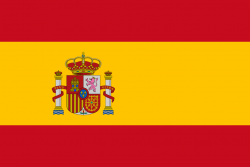Phrases 101: Surviving coronavirus in a foreign country
Being a digital nomad or an expat living abroad can be challenging during these times, especially now that the coronavirus is making all of us learn previously unfamiliar terms like “suspected case”, “community spread”, “index case”, and more. Now imagine having to learn these terms in a foreign language, like French, Spanish, or German. Fortunately, we’re here to help. If you live abroad and are struggling to keep up with the essential terminology, here are 8 useful phrases in different languages that can help you stay up-to-date with the COVID-19 crisis.

Photo via Flickr
French

Photo via Wikimedia
Are you living in France at the moment and would like to understand President Macron’s announcements on TV? Knowing these phrases and terms will help you grasp the general meaning of the news related to coronavirus:
- Cas confirmé– Confirmed case
- Cas suspect/cas investigué– Suspected case
- Décès– Deaths
- Isolement – Isolation (Today, France is under a self-isolation policy that requires everyone, except for essential workers, to stay home to prevent the spread of the virus.)
- Se laver les mains très régulièrement – Wash your hands regularly (especially if you have to go outside. The World’s Health Organization recommends that the process should last at least 40 seconds.)
- Tousser ou éternuer dans son coude – Cough or sneeze into your elbow (to avoid spreading the virus)
- Saluer sans se serrer la main, éviter les embrassades – Greet people without shaking hands, avoid hugs (to minimize spread of the contagion)
- Utiliser des mouchoirs à usage unique– Use disposable tissues (and throw them away immediately if you cough or sneeze into them)
German

Photo via Wikimedia
If you are based in Austria, Germany, or another German-speaking country, you will certainly find these phrases useful to be better prepared to protect yourself against the disease:
- Mensch zu Mensch– From person to person (be aware: that this is how the virus spreads)
- Bestätigte Fälle – Confirmed cases
- Todesfälle – Deaths (Germany has one of the lowest death rates for coronavirus in the world)
- Distanzierung– Distancing (aka self-isolation) (Germany and Austria have enforced preventive measures to promote self-isolation, with only essential workers and those partaking in exercise alone permitted to leave their homes.)
- Händewaschen – Wash your hands (regularly throughout the day, for at least 40 seconds)
- Niesen/husten sonst Ellenbeuge – Cough or sneeze into your elbow
- Händeschuttein und Umarmungen vermeiden – Don’t shake hands or hug people (greet them with a wave, instead)
- Verwenden Sie Einweg-Taschentücher – Use disposable tissues
Spanish

Photo via Wikimedia
In case you are in Latin America or Spain, of one of the 20 countries around the world where Spanish is the official language, here are some words and phrases to help you understand the news and the recommendations given by the local governments on how to protect yourself from the virus:
- De persona a persona – From person to person
- Caso sospechoso – Suspected case (in the case of Latin America, people who have arrived from abroad and are waiting for their coronavirus test results to arrive)
- Muertes – Deaths
- Aislamiento – (Spain and most Latin American countries today are taking preventive measures against the virus, including complete self-isolation in countries like Argentina.)
- Lávese las manos regularmente – Wash your hands regularly (Experts recommend using water and soap, or hand sanitizer when soap is unavailable.)
- Toser o estornudar en el codo – Cough or sneeze into the insides of your elbows.
- Saludar sin dar la mano o un beso – Greet people without shaking hands or kissing them (Kissing cheeks as a greeting is very common in Latin America; In countries like Chile, they even greet others with two kisses!)
- Utilizar pañuelos descartables y tirarlos inmediatamente – Use tissues and discard them immediately after using them.
